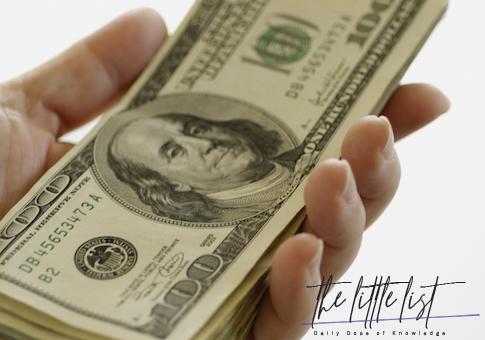Is it illegal to hoard cash?
Is it Illegal to Keep Large Amounts of Cash at Home? … It’s not illegal to keep plenty of cash at home. There’s no limit as to the amount you can keep at home. However, the police may consider this unusual and may think that you’re doing some suspicious activities.
Also, How do I store large amounts of cash?
To store large amounts of cash it’s usually best to keep it hidden in a fireproof and waterproof safe that’s out of reach. Just avoid keeping all of your cash in one place. Having multiple locations helps protect you against the risk of losing all your money in one event.
How can I hide my money at home?
Effective Places to Hide Money
- In an envelope taped to the bottom of a kitchen shelf.
- In a watertight plastic bottle or jar in the tank on the back of your toilet.
- In an envelope at the bottom of your child’s toybox.
- In a plastic baggie in the freezer.
- Inside of an old sock in the bottom of your sock drawer.
Can I deposit 50000 cash in bank?
When a cash deposit of $10,000 or more is made, the bank or financial institution is required to file a form reporting this. This form reports any transaction or series of related transactions in which the total sum is $10,000 or more. So, two related cash deposits of $5,000 or more also have to be reported.
How can I legally hide money?
Let us take a look at five of the most popular ways to legally hide and protect your money.
- Offshore Asset Protection Trusts. …
- Limited Liability Companies. …
- Offshore Bank Accounts. …
- Retirement Accounts. …
- Transfer of Assets.
Can you get in trouble for having too much cash?
Under federal and state laws, law enforcement officers can seize property, including cash, if the money is earned from or used to commit a crime. … If police have reason to believe that you are involved in certain illegal activities, such as selling drugs, they can seize any property you have on you, including cash.
Can money rot in a safe?
The money will remain moist or wet for a long time, even if not sitting in water, and it will continue to degrade.” He expects that within a few years, those outer bills won’t be salvageable, but the inner bills may last a few decades thanks to less moisture and less exposure to mold spores in the air.
How much cash should I keep at home in case of emergency?
An emergency fund can serve as your personal safety net during periods of financial stress. While you’re working, we recommend you set aside at least $1,000 for emergencies to start and then build up to an amount that can cover three to six months of expenses.
Where do thieves look for money in your house?
Bedroom closet
A thief might rummage through your entire closet—pockets and all—looking for cash or other valuables.
What is the safest place to keep money?
Savings accounts are a safe place to keep your money because all deposits made by consumers are guaranteed by the Federal Deposit Insurance Corporation (FDIC) for bank accounts or the National Credit Union Administration (NCUA) for credit union accounts.
How much cash should you keep at home?
Most financial experts end up suggesting you need a cash stash equal to six months of expenses: If you need $5,000 to survive every month, save $30,000. Personal finance guru Suze Orman advises an eight-month emergency fund because that’s about how long it takes the average person to find a job.
How much cash deposit is suspicious?
The $10,000 Rule
Ever wondered how much cash deposit is suspicious? The Rule, as created by the Bank Secrecy Act, declares that any individual or business receiving more than $10 000 in a single or multiple cash transactions is legally obligated to report this to the Internal Revenue Service (IRS).
How much money can I deposit without being flagged?
The Law Behind Bank Deposits Over $10,000
The Bank Secrecy Act is officially called the Currency and Foreign Transactions Reporting Act, started in 1970. It states that banks must report any deposits (and withdrawals, for that matter) that they receive over $10,000 to the Internal Revenue Service.
How much cash should I keep at home?
Most financial experts end up suggesting you need a cash stash equal to six months of expenses: If you need $5,000 to survive every month, save $30,000. Personal finance guru Suze Orman advises an eight-month emergency fund because that’s about how long it takes the average person to find a job.
Can government take your savings?
Now, you may think that the government is not “allowed” to go take money from your personal savings account. But they are. … The bank OWES you the money back, but it is under no obligation to actually give it back to you. And at any time, the federal government can go and take that money for a variety of reasons.
Is it illegal to have large amounts of cash?
Having large amounts of cash is not illegal, but it can easily lead to trouble. Law enforcement officers can seize the cash and try to keep it by filing a forfeiture action, claiming that the cash is proceeds of illegal activity. And criminal charges for the federal crime of “structuring” are becoming more common.
Should I keep my money in the bank or at home?
In short, it is better to keep your money in the bank than at home. For one, banks carry insurance, which allows you to recuperate your money in the event of fraudulent withdrawals or charges.
How much cash is suspicious?
Ever wondered how much cash deposit is suspicious? The Rule, as created by the Bank Secrecy Act, declares that any individual or business receiving more than $10 000 in a single or multiple cash transactions is legally obligated to report this to the Internal Revenue Service (IRS).
How can I hide money legally?
Let us take a look at five of the most popular ways to legally hide and protect your money.
- Offshore Asset Protection Trusts. …
- Limited Liability Companies. …
- Offshore Bank Accounts. …
- Retirement Accounts. …
- Transfer of Assets.
Where should I keep my money at home?
As per Vastu Shastra, one of the best ways to ensure financial stability is to grow your wealth in the earth corner of the home —the south-west. All your jewellery, money and important financial documents must be kept in the south-west (store such things in a cupboard or safe), facing north or north-east.
How much cash is too much at home?
Finding secure and clever places to hide your emergency fund can safeguard the security of your assets; think of it as making a bank within your home. Common advice is to keep some cash at your house, but not too much. The $1,000 cash fund Prakash recommended for having at home should be kept in small denominations.
Is saving cash a good idea?
Most financial experts end up suggesting you need a cash stash equal to six months of expenses: If you need $5,000 to survive every month, save $30,000. … If you don’t have an emergency fund, you should probably create one before putting your financial goals/savings money toward retirement or other goals.
Is $10000 a lot of money?
Having $10k saved is a commendable milestone but overall it is not typically considered to be a lot of money. For a majority of Americans today, this amount may only cover 3-6 months of living expenses pending their lifestyle and where they live.




